ChatGPT is an AI-powered chatbot by OpenAI often used for homework help and tutoring assistance. It competes in the online education space by answering questions and explaining concepts.
To set expectations quickly, here’s a visual snapshot of ChatGPT reviews, pricing, and what it’s best used for.
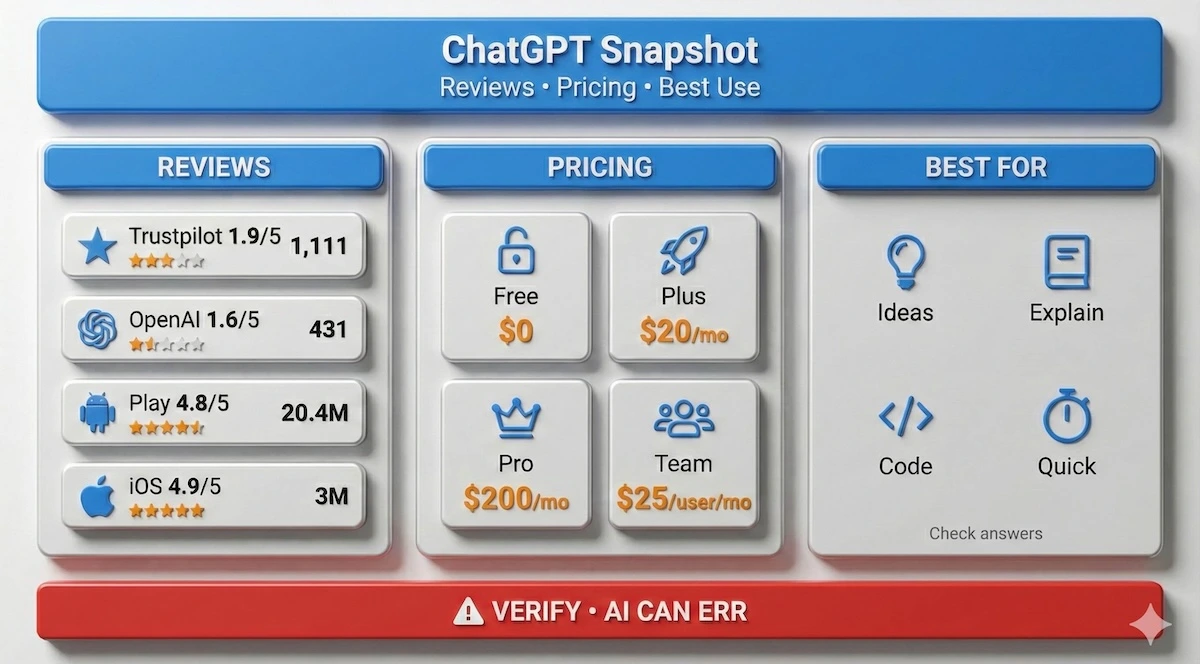
This ChatGPT reviews snapshot summarizes ratings, pricing tiers, and best student use cases in one quick visual.
Use this as a quick guide, and remember to verify important answers.
This article provides detailed insights into ChatGPT for students and parents comparing tutoring platforms, so they can make informed choices.

ChatGPT Reviews and Testimonials
Trustpilot (ChatGPT.com) – 1,111 reviews, 1.9/5 average. Feedback is mixed. Some users praise its power as an AI tutor, while many complain about accuracy. For example, one user wrote that it “cannot recreate any saved data” and is “horrible”. Another reviewer called it “the best available AI tool” but noted frustrating limitations. Common likes are its instant help and broad knowledge, while dislikes focus on errors, formatting issues, and reliability problems.
Trustpilot (OpenAI) – 431 reviews, 1.6/5 average. Most reviews here are negative. Users report that ChatGPT often “basically lies and gives answers you want, then does the opposite”. One reviewer noted it “doesn’t know any basic info” like the number of days in a month, showing frustration with wrong answers. Overall, OpenAI’s Trustpilot page shows users saying ChatGPT is confusing and makes mistakes, with few positive comments.
Google Play Store (ChatGPT Android) – 20.4 million reviews, 4.8/5 average. Android users are very positive. Many praise its usefulness and ease of use. For example, one reviewer wrote that ChatGPT “helped me with numerous things, very simple and intelligent, extremely useful”. Some users do point out issues: one asked OpenAI to improve the voice input feature. In general, Google Play ratings suggest a highly satisfied user base enjoying the AI’s versatility.
Apple App Store (ChatGPT iOS) – 3 million ratings, 4.9/5 average. iOS reviews are overwhelmingly positive. Users say ChatGPT made learning easier. For example, one review describes using ChatGPT for advanced statistics classes: it “broke problems down step by step” so the student earned an A+ grade. Other reviews praise its role in brainstorming and problem-solving. High app ratings indicate many iPhone users value ChatGPT’s help.
Is ChatGPT legit? Yes – ChatGPT is a real product of OpenAI with a large user base. Millions of users rate it highly on app stores (4.8/5 on Google Play, 4.9/5 on iOS), showing it’s widely used.
Ratings can look contradictory across sites—this visual puts them on one scale so you can compare apples to apples.
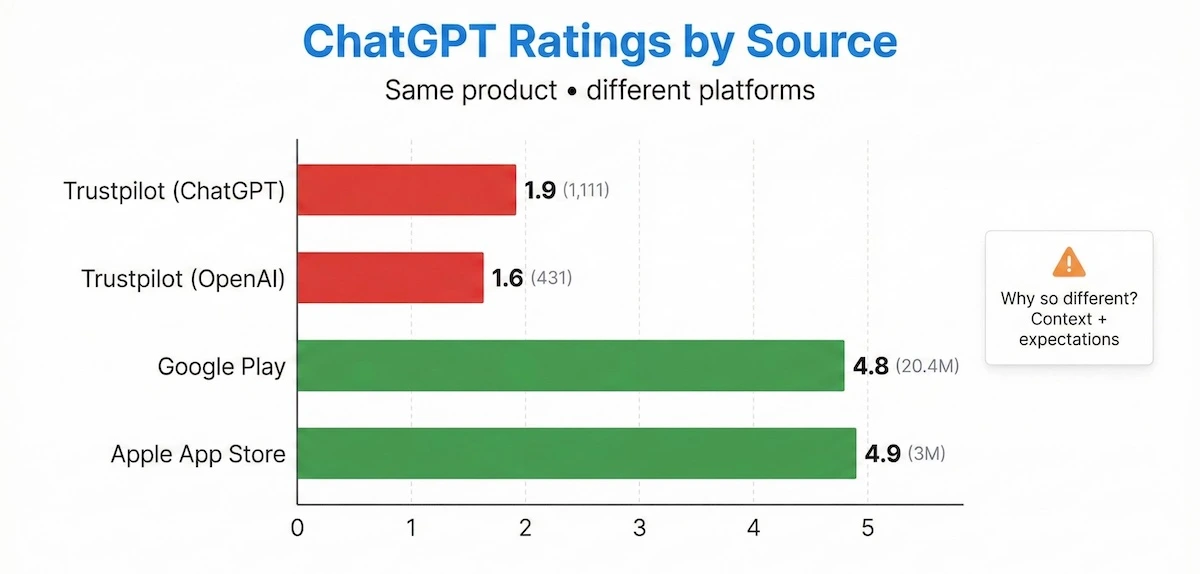
This chart compares ChatGPT reviews across Trustpilot and app stores so students can interpret trust signals correctly.
Use multiple sources to judge reliability, especially for homework accuracy.
The above reviews confirm it’s not a scam, though they also warn of errors. Summarizing, ChatGPT is legitimate (not a fake service), but its reliability is sometimes questioned by users.
ChatGPT Pricing
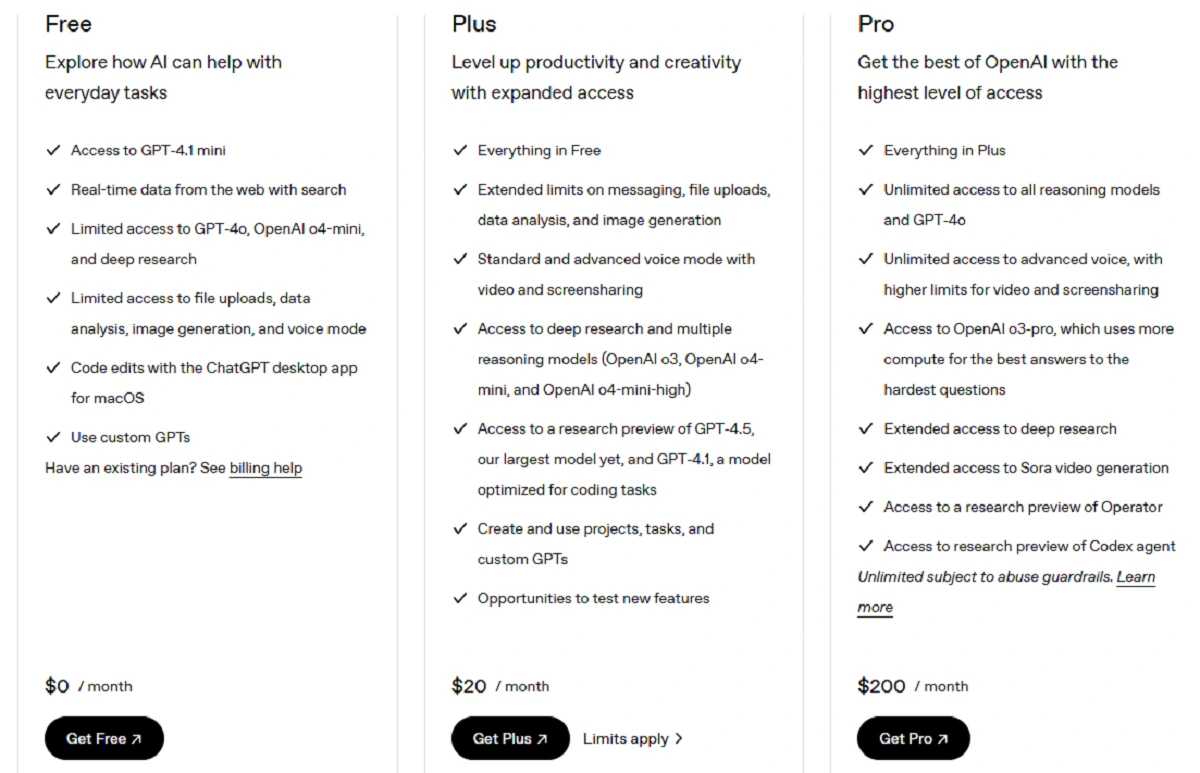
Pricing Range
ChatGPT’s basic service is free (USD $0/month). For more features, it offers subscriptions: ChatGPT Plus at $20/month (USD), and a higher-end Pro plan at $200/month. There are no per-hour or per-session fees – it’s flat-rate subscription based. The free tier provides standard access, while paid plans give faster response and advanced AI (like GPT-4.5). For teams or businesses, it offers per-user pricing (e.g. $25 per user per month if billed annually). (All prices are in USD.) See the official pricing page for details.
Here’s a visual breakdown of ChatGPT pricing tiers, including how billing works and what to watch for.
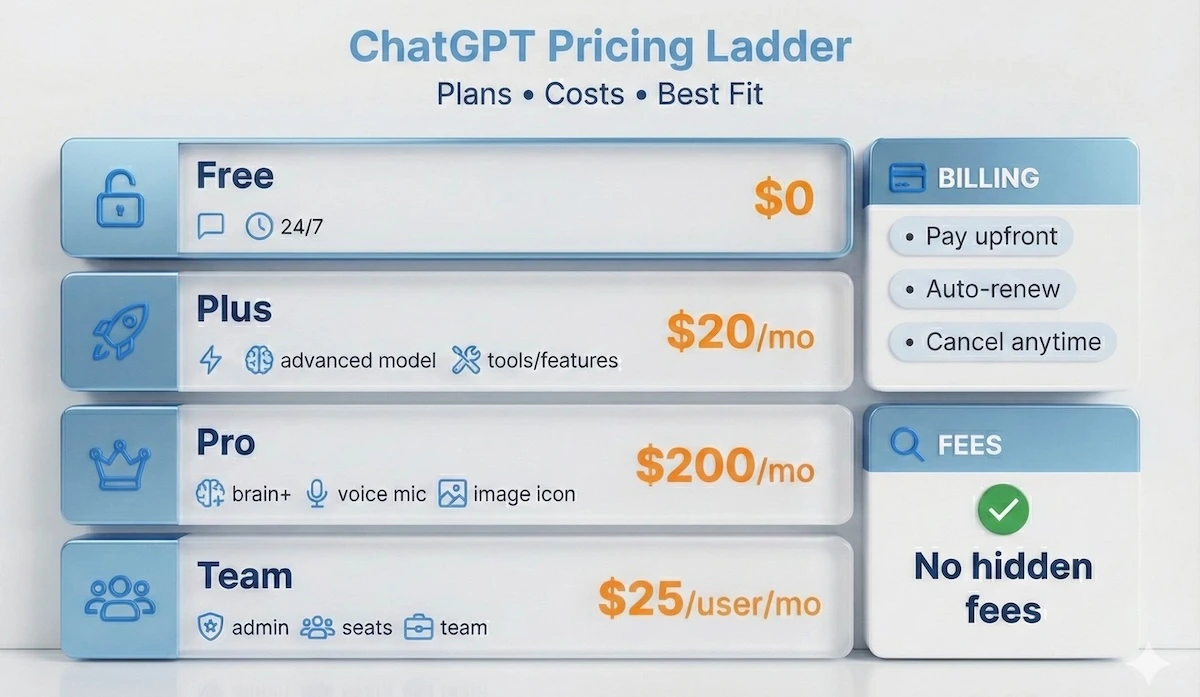
This ChatGPT pricing infographic breaks down Free, Plus, Pro, and Team tiers so students understand costs at a glance.
If you need guaranteed correctness on tough problems, pricing alone shouldn’t be your only decision factor.
What students say about ChatGPT pricing
Opinions on ChatGPT’s cost are mixed. Many heavy users say the $20 monthly fee for Plus is “worth it” for unlimited access and new features. One commenter said they subscribed after months on the free version and have “no regrets”. Others disagree – some feel even paid ChatGPT is not reliable enough. For example, a student complained that it “forgets too much” and “is too slow,” calling Plus “not worth it”. In general, ChatGPT’s pricing is in line with similar AI services: it’s cheaper than private tutoring, but not free at the high end. The free plan does help keep costs low for basic use.
Hidden costs
ChatGPT has virtually no hidden fees. There’s no registration charge or per-question charge. The only costs are the monthly subscription fees (Free vs Plus/Pro). OpenAI does not list any additional fees for usage. EU/UK/Turkey users can get a full refund if they cancel within 14 days, and cancellations outside that period require contacting support. We found no evidence of undisclosed extras – users simply pay their monthly fee.
How ChatGPT’s pricing works
Users pay in advance, usually by credit/debit card (or via Apple/Google in-app payment). There is no “pay later” option – subscriptions renew monthly automatically. Plans are fixed (Plus, Pro) rather than hour-based. There are currently no widespread promo codes or category discounts, though OpenAI did offer a limited student discount program in the US/Canada. No built-in group or army discounts exist (aside from the Team pricing mentioned above). In short, ChatGPT’s pricing is straightforward: choose a free or paid plan, pay monthly, and use the service without extra charges.
Free Trial
ChatGPT does not have a traditional free trial for paid plans. Instead, anyone can use the basic version for free at any time (no trial needed). OpenAI has occasionally offered limited free trial invites for ChatGPT Plus via referral codes, but these are not broadly advertised and require a credit card. Basically, the long-term “free trial” is just using ChatGPT’s free tier, since it remains available without cost.
Refund policy
OpenAI’s official refund policy requires contacting their support. For web subscriptions, users must log into ChatGPT and request a refund via the Help Center chat. EU, UK, and Turkish users get a guaranteed full refund if they cancel within 14 days. App store subscriptions (Apple/Google) must be refunded through Apple or Google. In reviews and forums, some users mentioned issues: e.g., one Trustpilot review said they “paid for ChatGPT Plus via Apple ID” but couldn’t restore it. Overall, ChatGPT will refund eligible payments, but there have been reports of support difficulties. We saw no widespread complaints of secret overcharges.
ChatGPT Alternatives
Some students look beyond ChatGPT for tutoring help, seeking either specialized tutors or different AI tools. Alternatives may offer more interaction, up-to-date info, or human guidance. Below are a few popular options:
Not all “alternatives” solve the same problem—this grid helps you match the tool to your exact situation.
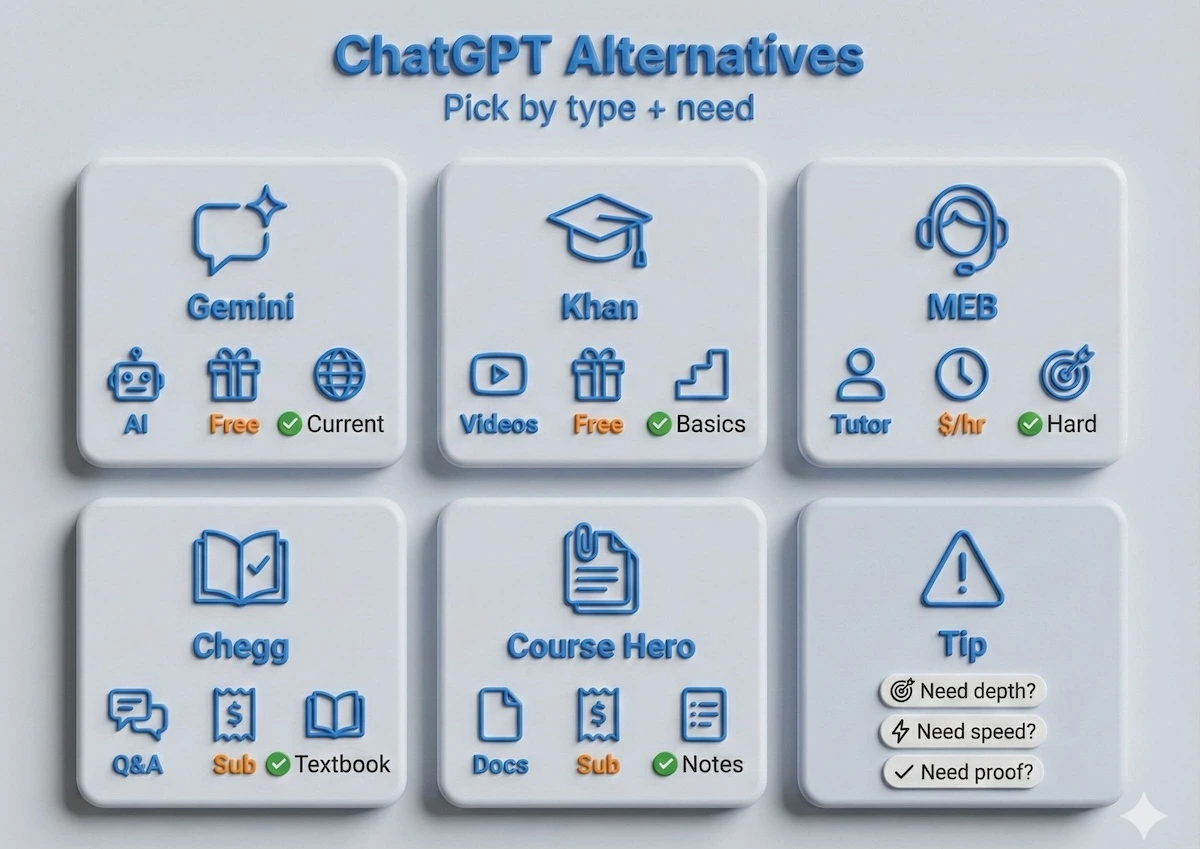
This ChatGPT alternatives comparison helps students pick between AI tools, learning platforms, and tutoring based on their needs.
For advanced engineering work, human guidance can save time by preventing repeated wrong attempts.
Google Bard (Gemini AI)
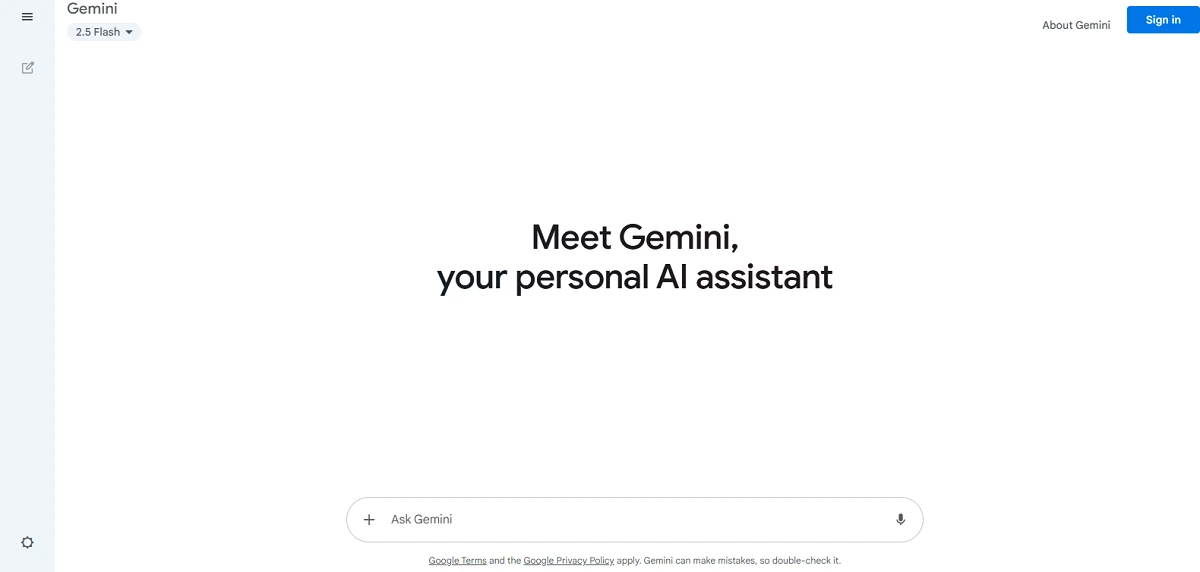
Pros: Bard is Google’s free AI chat, based on Gemini models. It can pull in current web data for up-to-date answers, and it’s always free to use. Many users find Bard’s conversational answers helpful and it’s easy to try without paying. Cons: Bard’s AI is generally a bit less advanced than ChatGPT’s GPT-4, so answers may be shorter or less detailed. It also sometimes makes errors or is less nuanced in logic. Unlike ChatGPT, Bard’s capabilities and response quality can be inconsistent. In summary, Bard is a good no-cost alternative with live web knowledge, but it may not match ChatGPT’s depth.
Khan Academy
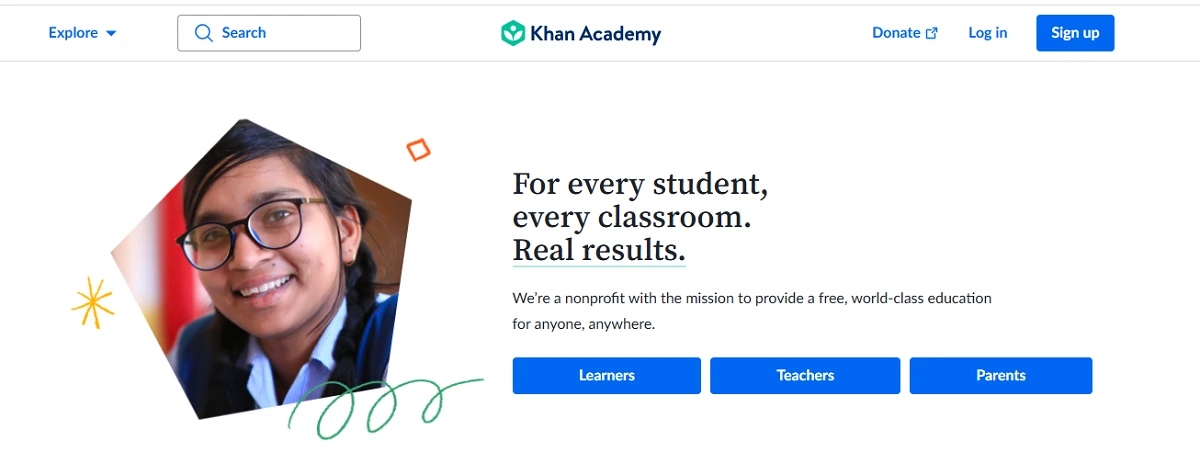
Pros: Khan Academy is a free educational platform with video lessons and exercises in subjects like math, science, and more. Its content is well-structured and curriculum-aligned, making it great for learning fundamentals step-by-step. Since it’s free, cost is not an issue. Cons: It isn’t interactive like ChatGPT – you watch videos or answer problems rather than ask questions in chat. It doesn’t cover every topic (especially advanced or niche subjects). For tutoring, you won’t get personalized answers on Khan Academy, only general lessons. Overall, it’s a top choice for guided learning, but lacks the instant Q&A style of ChatGPT.
My Engineering Buddy
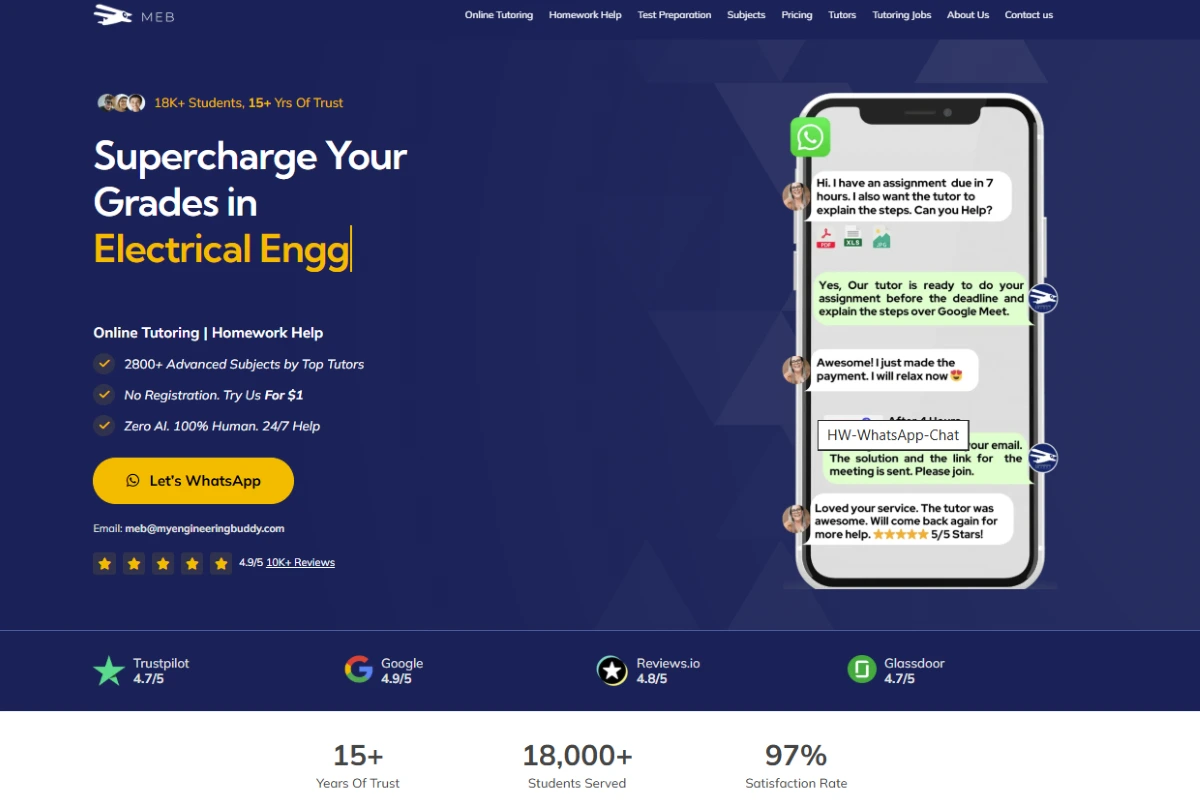
Pros: My Engineering Buddy (MEB) provides live 1-on-1 tutoring by expert tutors (often with engineering backgrounds). Students get personalized attention and can ask very specific homework questions. MEB is strong on advanced engineering and math topics, with tutors guiding each problem to ensure understanding. Cons: It is a paid service, usually costing per hour (often in the $10–$30/hour range), so it can be more expensive than ChatGPT’s free AI. Scheduling sessions is needed (though they offer 24/7 tutors), and the help is only in English. Many students praise MEB for in-depth help and improved grades, but it requires budgeting and scheduling compared to ChatGPT’s instant availability.
Chegg Study
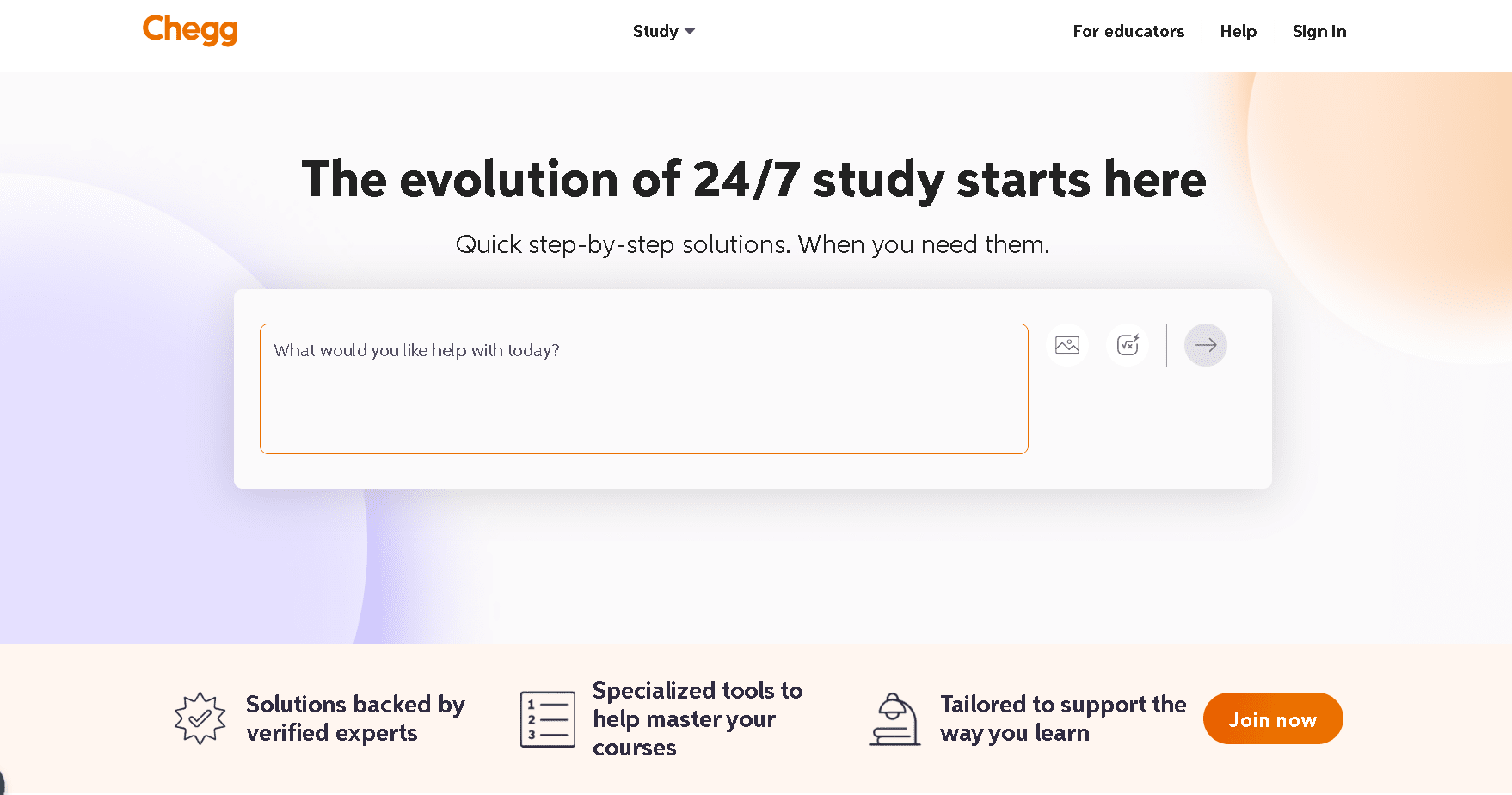
Pros: Chegg is a subscription Q&A and homework help site. It offers textbook solutions and allows you to post questions to tutors or get help from its database. Chegg covers many subjects (especially STEM) and is easy to use. Cons: It costs about $15 per month or more, and answers can be generic or not fully explained. Some students criticize that Chegg’s solutions aren’t always explained well or can be outdated. Chegg also has a “pay-per-use” tutor option. In comparison, ChatGPT is more interactive and instant, but Chegg provides ready-made solutions and book answers. Chegg’s validity is mixed (some instructors ban it), whereas ChatGPT is a new AI approach.
Course Hero
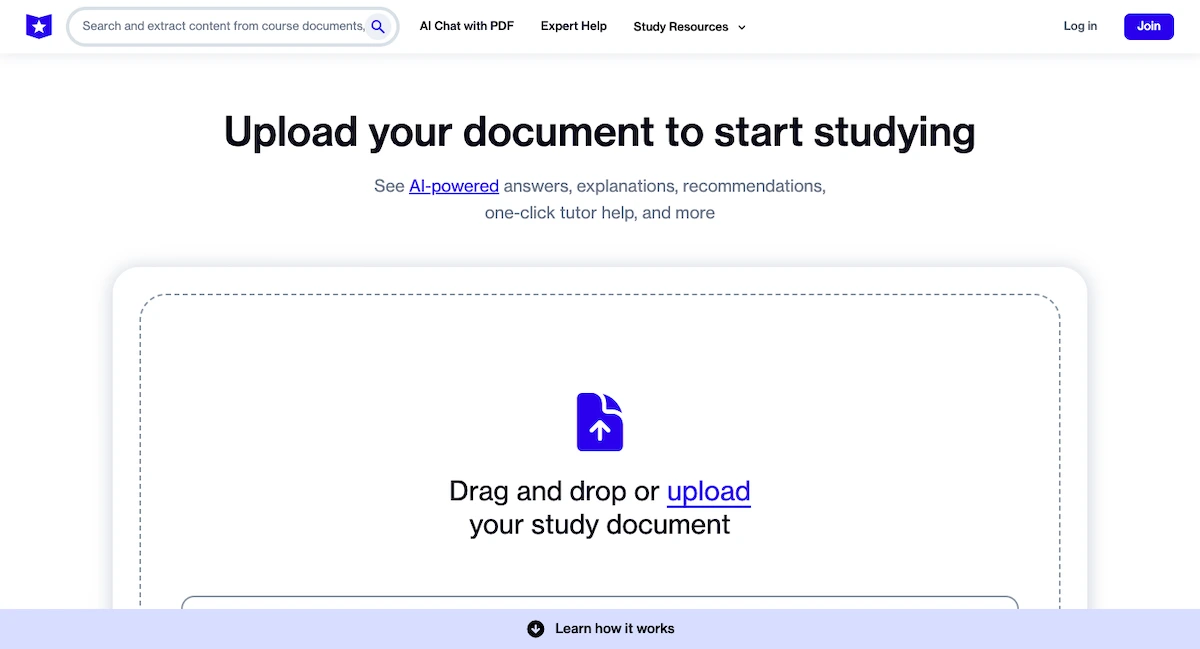
Pros: Course Hero offers study resources, notes, and a question-and-answer forum. It has a large library of academic content and the option to ask subject experts questions. Like Chegg, it’s oriented around college-level coursework. Cons: You need a paid subscription to unlock answers (around $10–$40 per month). Answers come from tutors or crowd-sourced, so quality varies. ChatGPT, being instant AI, often answers faster. Course Hero excels at providing document-based study material and step-by-step solutions (when available), but ChatGPT can answer more flexibly across topics. It’s another paid alternative, whereas ChatGPT has free usage.
Why consider alternatives?
Students may seek alternatives because ChatGPT can sometimes be limited in accuracy, coverage of certain fields, or depth of explanation. Human tutors (like on MEB) or specialized platforms (Chegg, Khan Academy) can offer more tailored teaching or vetted content. Cost and convenience also play a role: some may prefer free resources like Khan Academy, while others want human interaction. Comparing features, pricing, and trustworthiness helps students pick the best option for their needs.
How it Works?
For Students
To use ChatGPT, a student simply signs up at the ChatGPT website (chat.openai.com) and logs in. No application or matching is needed – once logged in, you type your question or assignment into the chat box. ChatGPT replies instantly with answers or explanations. There is no scheduling; it’s available 24/7 on demand. Students can keep refining their questions in the chat until satisfied. ChatGPT also offers mobile apps for iOS and Android, letting students get help on their phone or tablet.
If you’re new to ChatGPT, this flow shows exactly how students typically use it for homework and studying.
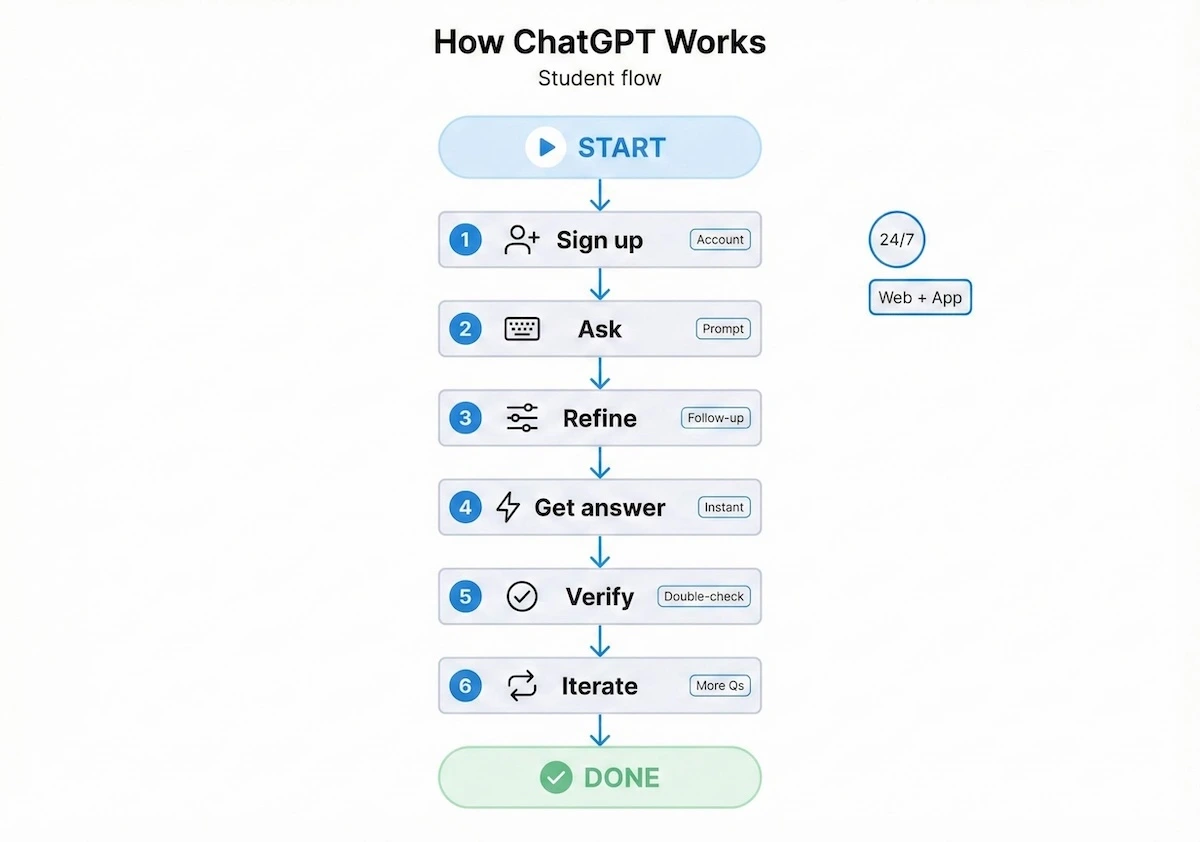
This how-it-works flowchart shows the exact steps students follow when using ChatGPT for homework help.
The key step most students skip is verification—do it every time on graded work.
For Tutors
ChatGPT does not use human tutors. It is an AI-only service. There is no way for an independent tutor to join ChatGPT as a teacher. (OpenAI hires engineers and researchers internally, but they are not public-facing tutors.) In other words, the “tutoring” on ChatGPT is entirely AI-generated, not provided by real people.
Company Information
Founding year and background: ChatGPT was launched in November 2022 by OpenAI, an AI research company. OpenAI was founded in 2015 by tech leaders including Sam Altman and Elon Musk. The goal was to create powerful AI for the benefit of humanity. ChatGPT quickly became OpenAI’s flagship product for AI-powered conversation.
Founder’s details: OpenAI’s key founders include Sam Altman (CEO) and Elon Musk (initial co-founder). Sam Altman, a former president of Y Combinator, leads the company. (Elon Musk left OpenAI’s board in 2018.)
Mission and vision: OpenAI’s charter states its mission is “to ensure that artificial general intelligence benefits all of humanity”. In other words, their goal is to safely develop AI technologies and share their benefits widely. The vision is to push AI research forward while keeping it aligned with human values. (OpenAI also emphasizes openness and safety in its approach.)
Scale of operation: OpenAI is headquartered in San Francisco, USA. ChatGPT is available worldwide – it’s a global service. It is especially popular in the US and other English-speaking countries. OpenAI has grown rapidly: by 2024 it employed over 2,000 people, including researchers, engineers, and support staff. ChatGPT itself has hundreds of millions of users internationally.
Types of services: ChatGPT offers AI-powered tutoring, including text-based conversation (GPT-4 chat), code assistance, and problem-solving. Paid plans add features like advanced voice chat and image/video generation. It integrates AI tools like DALL·E for image creation and Sora for video content. (Refer to the pricing page for a full list of included services.)
Subjects offered: ChatGPT can cover virtually any subject. Major examples include mathematics, physics, chemistry, engineering, computer science, biology, economics, and humanities (writing, history, languages). OpenAI emphasizes that ChatGPT is a generalist tutor – it can help with almost any academic topic from elementary through college level. One community description even calls it an “All Subjects Tutor” for any level of study.
Unique features: ChatGPT advertises several distinctive features:
- Multimodal AI: It accepts text, voice, and image inputs. The mobile app highlights “Advanced Voice Mode” and the ability to analyze images.
- 24/7 availability: Unlike scheduled tutoring, it’s online anytime, syncing your history across devices so you can continue sessions on phone or computer.
- Cutting-edge models: It runs on the latest GPT-4/GPT-4.5 AI, with improvements over time. It also offers custom GPTs and plugin support for specialized tasks.
- Free access: The basic version is free to use, which is a big draw. Many users like that they can try the full AI without payment.
USP of ChatGPT
- Advanced AI tutor: OpenAI markets ChatGPT as a powerful AI that can answer questions on any subject. In practice, many students praise it for solving complex problems and explaining concepts (e.g. one said it helped earn an A+ in statistics). It truly offers one of the most capable conversational AIs available.
- Free basic use: The service offers a no-cost tier, which users love. No money-back is needed since basic use is free. As one iOS review notes, “the official app is free” and even syncs your chat history across devices. This makes it easier to try than paid tutor sites.
- Multimodal features: ChatGPT supports images and voice. The app advertisement highlights “Image generation” and “Advanced Voice Mode”, which many users find unique. For instance, students can take a photo of a math problem and ask the AI to solve it.
- Always-available help: It works 24/7 with instant responses. Students appreciate that it never needs a break. Many compare this to human tutoring – one Android user called it “extremely useful” for tackling tasks anytime.
Drawbacks of ChatGPT
- Accuracy issues: ChatGPT can give wrong or made-up answers. Several user reviews say it “lies” or “gives answers then does the opposite”. This is a common criticism and means answers must be double-checked.
- Context/memory limits: It may lose track of a long conversation. As one Reddit user noted, ChatGPT “forgets too much, is too slow” and may not remember earlier parts of a chat. This can disrupt multi-step explanations.
- Outdated knowledge: Its training data cuts off around 2021, so it doesn’t know about the latest events or research. In contrast, a human tutor can incorporate current info.
- No personal interaction: Unlike human tutors, ChatGPT has no real empathy or teaching intuition. It gives generic answers, so some students find it less motivating or understandable than speaking to a person.
- Limited support: ChatGPT users rely on online help, not direct human support. There’s no live tutor to ask follow-up questions beyond what the AI provides.
Comparison with My Engineering Buddy
My Engineering Buddy (MEB) offers live 1:1 online tutoring by expert engineers, while ChatGPT is an AI. MEB tutors typically hold advanced engineering or math degrees and give step-by-step, personalized explanations. In pricing, MEB tutors often charge per hour (e.g. $10–$30+), compared to ChatGPT’s flat $20/mo or free tier. In reviews, students say MEB provides more reliable solutions for very difficult subjects, whereas ChatGPT is valued for instant quick answers.
Students who used both often praise MEB’s personalized attention. For example, MEB testimonials highlight friendly tutors who adjust to a student’s pace. Such feedback suggests MEB excels when hands-on guidance is needed. For complex homework, many recommend MEB because real tutors can clarify doubts and ensure understanding – something an AI alone might miss.
In summary, ChatGPT is great for rapid, broad answers on many topics, but My Engineering Buddy stands out for deep, advanced tutoring. MEB’s personal touch and specialized expertise make it a strong alternative for students needing high-level help or guaranteed accuracy.
If you’re unsure whether ChatGPT is enough, this simple decision flow helps you choose the right kind of help.
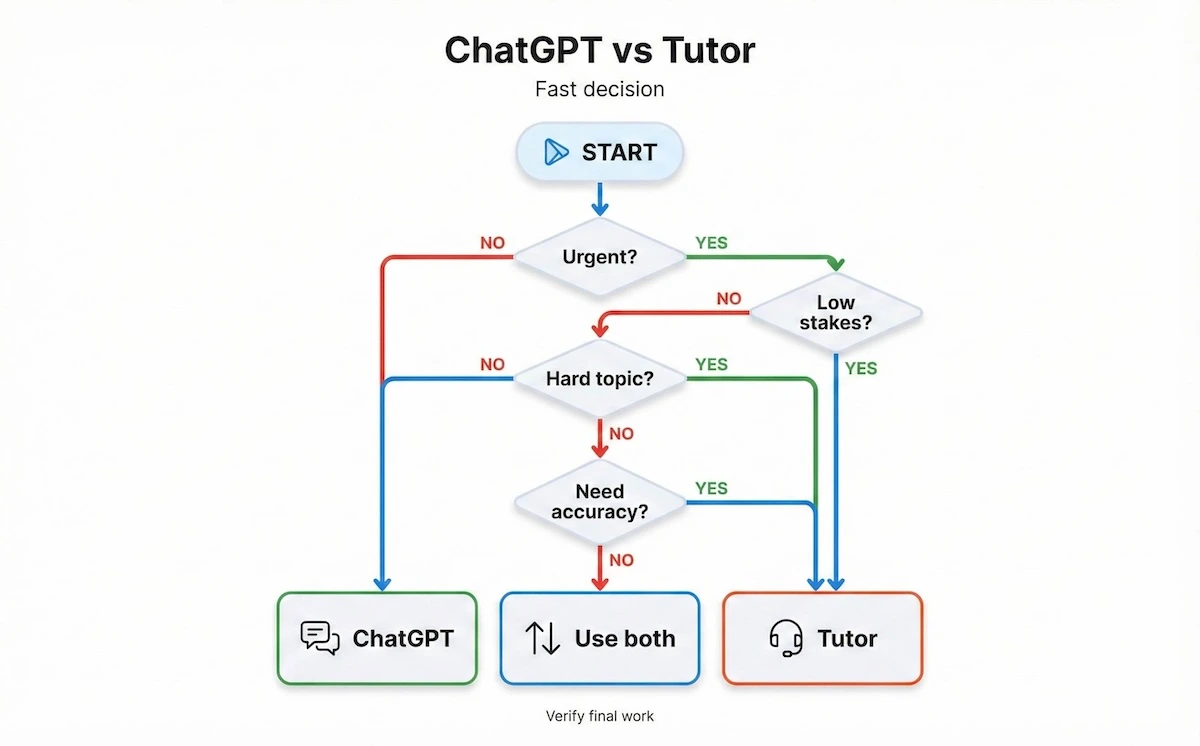
This decision flowchart helps students choose ChatGPT, a human tutor, or both based on urgency and accuracy needs.
For complex engineering homework, combining quick AI drafts with tutor verification often saves the most time.
Customer Support and Policies
ChatGPT’s customer support is mostly online-only. Users must use the ChatGPT help center to get assistance or refunds. There’s no phone or live chat support for free users. OpenAI’s published policies (like the 14-day refund window for EU/UK) are straightforward. Some reviews note that dealing with OpenAI support can be slow if issues arise. By contrast, My Engineering Buddy advertises 24/7 live tutor support and dedicated customer help. In practice, MEB students often report faster responses from real people (tutors or support staff) than typical AI chat support.
Global Reach and Localization
ChatGPT is a global platform designed for worldwide use. It supports over 80 languages, including major ones like English, Spanish, French, German, Chinese, Japanese, Arabic, and many more. This lets it serve students around the world, though the interface is primarily English. There is no region-specific version or localized content. In contrast, My Engineering Buddy is focused on English-speaking markets and matches students to tutors who speak their language. ChatGPT’s broad language support means it can answer queries in many languages, but its main offerings and documentation remain in English.
ChatGPT’s Future Plans
OpenAI continues to advance its AI. In early 2025 it released GPT-4.5 as a research preview, aiming for “stronger reasoning” and broader knowledge. This model is designed to follow user intent better and hallucinate less. The company also announced plans for GPT-5 (expected summer 2025), which will unify its text and multimodal advances. In parallel, OpenAI is expanding ChatGPT’s outreach: for example, they launched a limited student discount program in the US/Canada to attract education users. Other upcoming features include collaborative study tools and improved safety measures. Overall, the trend is to make ChatGPT smarter and more user-friendly with each update.
FAQs About ChatGPT
How does ChatGPT compare to My Engineering Buddy? ChatGPT is an AI chatbot that answers questions instantly, whereas My Engineering Buddy connects students with live human tutors. ChatGPT is free/basic (with paid upgrades) and works anytime, but it lacks personal guidance. MEB charges per session with expert tutors, offering step-by-step help. Students use ChatGPT for quick answers, but turn to MEB for deep explanations and complex subjects.
Is ChatGPT free? Yes. The standard ChatGPT service is free to use (no cost). There are paid plans (Plus, Pro), but the basic chat is always free. So students can get help without paying unless they want the extra features that come with a subscription.
How do I start using ChatGPT? Simply go to chat.openai.com and create a free account. You can use your email or Google login. After logging in, you type any question into the chat box and it will reply right away. There is no application or waiting list – it’s open to all students immediately.
Does ChatGPT have a mobile app? Yes, official ChatGPT apps exist for both iOS and Android. The Apple App Store and Google Play Store versions are free downloads. They sync your chat history with the website. So you can use ChatGPT on your phone or tablet just as easily as on a computer.
What is ChatGPT Plus, and is it worth it? ChatGPT Plus is the $20/month subscription that gives access to newer AI models (GPT-4.5) and faster performance. For heavy users, it’s often worth it. Many say Plus provides smoother, more reliable answers and priority during busy times. If you only use ChatGPT occasionally, the free version may be enough. Users on forums report mixed opinions, but generally advanced students who use it daily find Plus helpful.
Are ChatGPT’s answers reliable? ChatGPT is usually correct but not perfect. It’s smart on many topics, but it can also “hallucinate” (make up facts). Teachers recommend checking its work against textbooks or other sources. Its reliability improved with recent updates, but it still sometimes gives errors, especially on nuanced questions. Always verify important answers.
Can ChatGPT solve math or homework problems? Yes, ChatGPT can solve many math problems and explain steps, similar to how you might solve them on paper. It can also help with essays, coding, and other homework. However, it might struggle with very long calculations or multi-step proofs. Use it as a learning aid, and double-check its work.
What is ChatGPT used for? Students use ChatGPT for studying and homework help. It can explain concepts, answer questions in subjects like math, science, history and more, and even help brainstorm ideas. It’s also used for writing assistance (grammar, essays) and coding help. Beyond education, people use it for tasks like writing emails or creating summaries. Its versatile usage makes it popular for many tasks.
How is ChatGPT updated? ChatGPT is continuously improved by OpenAI. The AI model is periodically upgraded (for example, from GPT-3 to GPT-4 and now GPT-4.5). These updates add capabilities and knowledge. Users don’t need to do anything – the service automatically uses the latest model if you have a paid plan or if it’s rolled out free. OpenAI also gathers feedback to fix mistakes and add features.
Does ChatGPT replace a human tutor? Not entirely. ChatGPT can answer questions and explain things, but it lacks the human element of teaching. It doesn’t know your personal learning style or feel if you’re confused. A good human tutor can adapt explanations and motivate you. ChatGPT is a helpful tool for fast answers, but many students still benefit from a real tutor for personalized guidance.
Conclusion
In summary, ChatGPT is a powerful AI tool with many strengths: instant 24/7 help, broad subject coverage, and a free tier for anyone. Its weaknesses include occasional inaccuracies and no human interaction. Its pricing is straightforward (free vs $20/month) and it has millions of satisfied users. Compared to ChatGPT, My Engineering Buddy offers real tutors and deeper subject expertise. For advanced students needing reliable, personalized tutoring, MEB can be a superior alternative. Overall, ChatGPT is excellent for quick answers and brainstorming, but a human-based service like My Engineering Buddy may be better for complex or guaranteed understanding.
******************************
This article provides general educational guidance only. It is NOT official exam policy, professional academic advice, or guaranteed results. Always verify information with your school, official exam boards (College Board, Cambridge, IB), or qualified professionals before making decisions. Read Full Policies & Disclaimer , Contact Us To Report An Error
